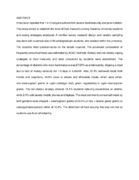| dc.contributor.author | Sewe, Daniel, S. | |
| dc.contributor.author | Lokuruka, Michael N.I. | |
| dc.date.accessioned | 2023-04-17T06:58:46Z | |
| dc.date.available | 2023-04-17T06:58:46Z | |
| dc.date.issued | 2022-05-20 | |
| dc.identifier.citation | Nutrition and Food Processing. 5(3); DOI: 10.31579/2637-8914/092 | en_US |
| dc.identifier.uri | DOI: https://doi.org/10.31579/2637-8914/092 | |
| dc.identifier.uri | https://karuspace.karu.ac.ke/handle/20.500.12092/2845 | |
| dc.description | Coping strategies to food insecurity | en_US |
| dc.description.abstract | It has been reported that 1 in 3 Kenyans suffers from severe food insecurity and poor nutrition. This study aimed to establish the level of food insecurity among Karatina University students and coping strategies employed. A nutrition survey research design and random sampling was done with a sample size of 94 undergraduate students, who resided within the university. The students filled questionnaires for the details required. The proximate composition of frequently consumed foods was estimated by AOAC methods. Dietary and non-dietary coping strategies to food insecurity and diets consumed by students were established. The percentage of students who were food insecure was 27.85% as evidenced by skipping a meal due to lack of money variously for 1-3 days in a month. Also, 22.3% borrowed foods from friends and neighbors, 48.9% stuck to simple and affordable meals, which were either, rice+beans/green grams or ugali+cabbage/ leafy green vegetables) or ugali+beans/green grams. The non-dietary strategy showed 18.1% students reducing expenditure on airtime, while 2.1% sold assets-mobile phones and laptops. The most commonly consumed meals by both genders were chapatti + beans/green grams at 24.5% or rice + beans/ green grams or cabbage/kales/spinach either at 12.8%. The dimension of food security that was not met by students was food affordability. | en_US |
| dc.language.iso | en | en_US |
| dc.subject | coping strategies | en_US |
| dc.subject | food insecurity | en_US |
| dc.subject | university students | en_US |
| dc.subject | Kenya | en_US |
| dc.title | Coping strategies to food insecurity employed by students of karatina university, kenya | en_US |
| dc.type | Article | en_US |
